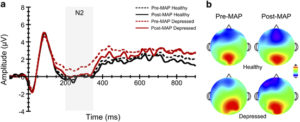
By John M. de Castro, Ph.D.
“All this data suggest mindfulness has real impactful changes on our minds and bodies. And it’s helped make mindfulness more kosher with the corporate world, where it might’ve previously been considered new-agey. Mindful workers report higher levels of happiness and productivity” – David Gelles
We spend approximately 25% of our adult lives at work. How we spend that time is immensely important for our overall well-being, including our psychological and physical health. Indeed, the work environment has even become an important part of our social lives, with friendships and leisure time activities often attached to the work environment. But, more than half of employees in the U.S. and nearly 2/3 worldwide are unhappy at work. This is primarily due to the fact that stress is epidemic in the workplace. A recent Harris poll found that 80 percent of workers feel stressed about one or more things in the workplace. This stress can lead to physical and psychological problems for managers and employees, including fatigue, sleep problems, depression, absenteeism, lower productivity, lower job satisfaction, and personal and professional burnout. Indeed, 46.4% of employees, report having psychological distress.
Mindfulness training of employees is a potential help with work related stress. It has been shown to reduce the psychological and physical reactions to stress overall and particularly in the workplace and to reduce burnout. A problem in implementing mindfulness programs in the workplace is the time required for the training. This makes many managers reticent to try it. So, it is important to develop programs that do not seriously impact on work time. A potential solution is to train mindfulness on-line. This is feasible as mindfulness training over the internet has been found to be effective for anxiety depression.
In today’s Research News article “Internet-Based Instructor-Led Mindfulness for Work-Related Rumination, Fatigue, and Sleep: Assessing Facets of Mindfulness as Mechanisms of Change. A Randomized Waitlist Control Trial.” See:
or see below
Querstret and colleagues randomly assigned full-time working adults to either receive a 4-week internet based mindfulness training or as a wait-list control. The mindfulness training was conducted on-line interactively led by experienced mindfulness instructors and was composed of elements from Mindfulness Based Stress Reduction (MBSR) and Mindfulness Based Cognitive Therapy (MBCT).
They found that the mindfulness training produced a significant increase in the mindfulness facets of acting with awareness, non-judging, and describing. Recovery from work was also significantly impacted by the mindfulness training with lower levels of emotional rumination and rumination after work about work-related issues, and lower levels of acute and chronic fatigue, and higher levels of sleep quality. These improvements were maintained 3 and 6 months following the end of mindfulness training. Finally, they found that the mindfulness training had its effects by altering the acting with awareness facet of mindfulness which, in turn, affected the work recovery variables.
These results demonstrate that an on-line mindfulness training program can have large and sustained effects on work-related problems. The fact that the program was conducted on-line is significant as these programs can be conducted without taking time away from work. This is important to employers and makes it more likely that such a program will be adopted.
It is interesting that the program appeared to work by affecting acting with awareness. This suggests that working with awareness is a key. By staying focused on their work tasks in the present moment the individual may be better able to perform them and thereby reduce stress and its consequent effects on after-work psychological processes. It is also known that mindfulness programs by themselves can lower the psychological and physiological effects of stress and improve emotion regulation, allowing the worker to experience their emotions but act adaptively in response to them. All of these effects of mindfulness training may add together to markedly improve the workers’ recovery from the stress of work.
So, recover from work with mindfulness.
“In this age of constant distractions and long hours, it’s difficult to find even a few minutes of time to reflect. Yet finding that time and space can help ease the stresses of your demanding working life.” -Peter Jaret
CMCS – Center for Mindfulness and Contemplative Studies
Study Summary
Querstret, D., Cropley, M., & Fife-Schaw, C. (2016, April 7). Internet-Based Instructor-Led Mindfulness for Work-Related Rumination, Fatigue, and Sleep: Assessing Facets of Mindfulness as Mechanisms of Change. A Randomized Waitlist Control Trial. Journal of Occupational Health Psychology. Advance online publication. http://dx.doi.org/10.1037/ocp0000028
This study aimed to extend our theoretical understanding of how mindfulness-based interventions exert their positive influence on measures of occupational health. Employing a randomized waitlist control study design, we sought to (a) assess an Internet-based instructor-led mindfulness intervention for its effect on key factors associated with “recovery from work,” specifically, work-related rumination, fatigue, and sleep quality; (b) assess different facets of mindfulness (acting with awareness, describing, nonjudging, and nonreacting) as mechanisms of change; and (c) assess whether the effect of the intervention was maintained over time by following up our participants after 3 and 6 months. Participants who completed the mindfulness intervention (n 60) reported significantly lower levels of work-related rumination and fatigue, and significantly higher levels of sleep quality, when compared with waitlist control participants (n 58). Effects of the intervention were maintained at 3- and 6-month follow-up with medium to large effect sizes. The effect of the intervention was primarily explained by increased levels of only 1 facet of mindfulness (acting with awareness). This study provides support for online mindfulness interventions to aid recovery from work and furthers our understanding with regard to how mindfulness interventions exert their positive effects.





